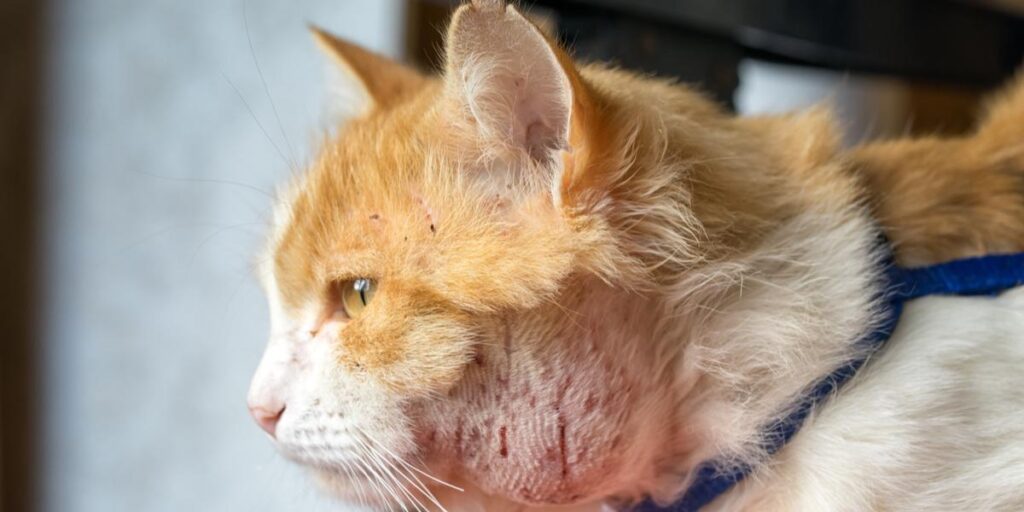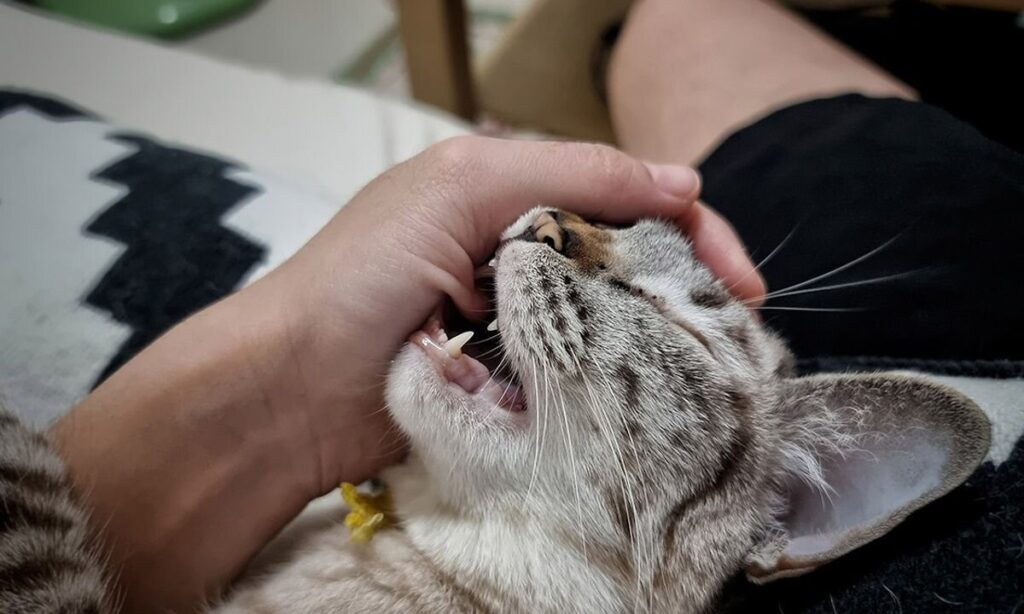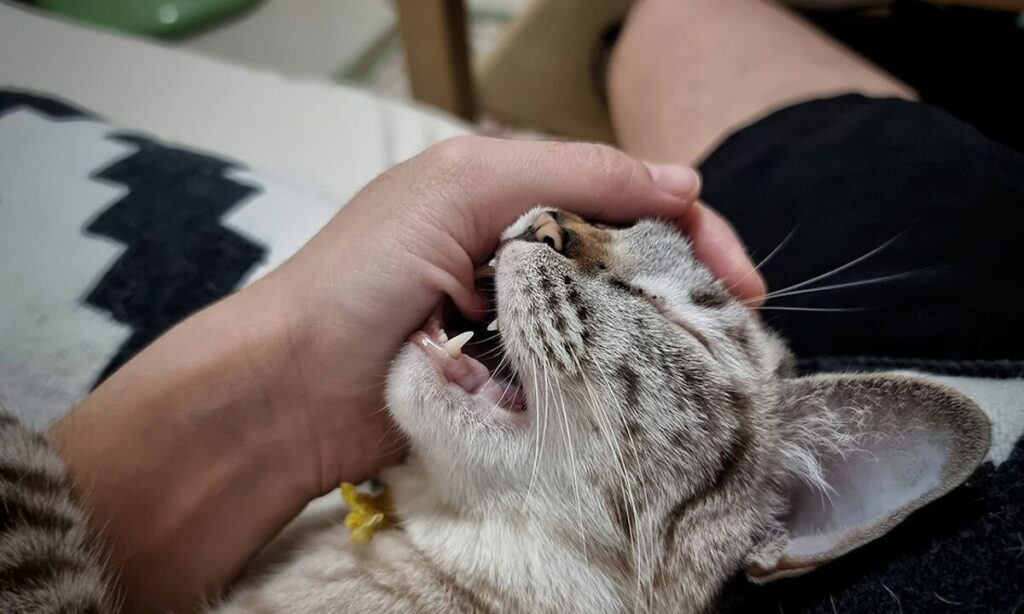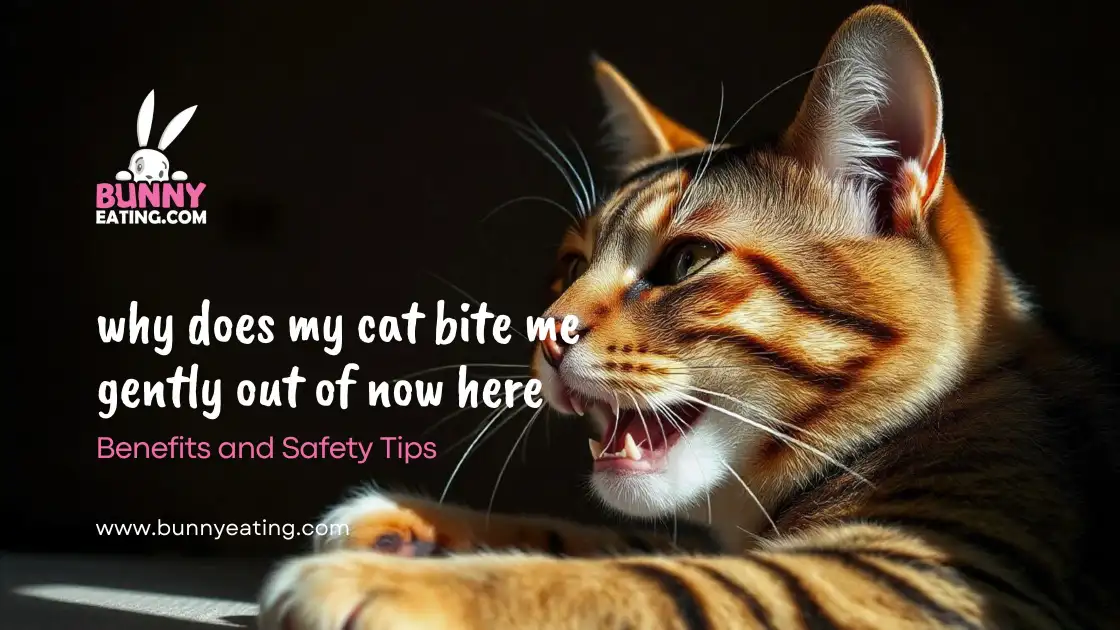Why Does My Cat Bite Me Gently Out of Nowhere refers to those surprising, soft bites from your cat that seem to come out of the blue. This behaviour can confuse cat owners. Understanding this gentle biting is key to interpreting your cat’s feelings.
Have you ever wondered why your cat suddenly nibbles you? It can feel unexpected and strange. Cats have their ways of communicating, and gentle bites can hold deeper meanings.
Why Does My Cat Bite Me Gently Out of Nowhere can indicate affection or playfulness. Cats often use gentle bites as a way to express love. It’s their way of interacting and showing they feel comfortable with you.
Why Does My Cat Bite Me?
When you experience a sudden gentle bite from your cat, it can be confusing. Cats bite for many reasons, and understanding these can help you respond appropriately. One of the primary reasons your cat might bite you gently is to communicate. Unlike humans, cats do not have verbal language, so they rely on their feline behaviour to express themselves. Gentle bites signify affection or playfulness, especially if your cat feels relaxed and comfortable around you.
However, not all bites are signs of affection. Sometimes, a cat may bite due to frustration, overstimulation, or even anxiety. It’s essential to differentiate between affectionate nibbles and bites that indicate discomfort. For example, if your cat engages in playtime behaviour but suddenly bites, it might mean they’ve reached their limit and need a break. Recognizing these cues can prevent misunderstandings and help you manage your cat’s behaviour better.
The Lowdown on Cat Biting

Cat biting can be categorized into different types, including gentle love bites and aggressive bites. Understanding these categories can help you interpret your cat’s actions more effectively. Gentle bites, often referred to as cat love bites, are usually harmless and can express affection. In contrast, aggressive bites may signal fear or a need for self-defence. It’s crucial to observe your cat’s body language to determine what type of bite you’re experiencing.
Knowing the difference between these types of bites can enhance your understanding of your cat’s emotional state. A gentle bite, paired with purring or kneading, indicates a happy and content cat. On the other hand, a quick snap accompanied by hissing or a stiff body suggests that your cat feels threatened. Recognizing these signs can help you respond appropriately and maintain a positive relationship with your feline friend.
The Importance of Understanding Cat Biting Behavior
Understanding cat-biting behaviour is vital for pet owners. When you can identify why your cat bites, you can take steps to reduce unwanted biting and strengthen your bond with them. Each time your cat bites, it communicates something significant. By paying attention to these signals, you can become a more attuned cat owner and provide a safe and loving environment for your pet.
Moreover, recognizing biting behaviour helps you anticipate and prevent future incidents. For instance, if you notice your cat is becoming overstimulated during petting, you can stop before a bite occurs. This proactive approach will not only keep you safe but also improve your cat’s emotional well-being. Understanding the context of each bite will lead to a more harmonious living situation.
Communication Through Biting
Cats are unique creatures that use various methods to communicate. While you might expect them to meow or purr, they often resort to biting, especially when words aren’t enough. Gentle bites can serve as a form of affection, particularly if they occur during grooming behaviour or cuddling. In these moments, your cat is likely trying to express their love or affection towards you.
However, it’s essential to pay attention to the context of the biting. If your cat bites when they want attention or when you stop petting them, they may be trying to communicate that they want more interaction. Understanding this form of communication can help you respond better to your cat’s needs, ultimately enhancing your bond.
What Are the Warning Signs My Cat Is Going to Bite Me?
Recognizing the warning signs that your cat is about to bite can save you from surprises. Cats often display various signals before they decide to bite, and knowing these can prepare you for their actions. One common sign is body language. A cat that is about to bite might twitch its tail, flatten its ears, or display dilated pupils. These are indicators of agitation or overstimulation.
Moreover, vocalizations can also provide clues. If your cat suddenly becomes vocal or starts growling, it might be a sign that they are feeling threatened or annoyed. By being observant and aware of these behaviours, you can prevent a gentle bite from turning into a more aggressive action. Understanding your cat’s signals will empower you to respond appropriately.
Understanding Your Cat’s Cues
Each cat has its unique personality, and understanding their specific cues can lead to a more harmonious relationship. Pay attention to how your cat reacts in different situations. For example, if your cat tends to bite after prolonged petting, it may be signalling that it needs a break. Observing your cat’s patterns will help you identify their comfort zones and boundaries.
Building this awareness fosters a deeper connection with your cat. When you understand their cues, you can create an environment where they feel safe and secure. This not only reduces the likelihood of bites but also strengthens your bond with your feline companion.
Body Language Indicating Potential for Biting
Cats communicate primarily through body language, and recognizing these signs can help you gauge their mood. When your cat’s body becomes tense, or its ears flatten against its head, it might be preparing to bite. Additionally, if your cat’s tail begins to swish rapidly, it indicates agitation and may lead to a bite if provoked further.
Moreover, when your cat begins to growl or hiss, these vocalizations serve as a clear warning that it is uncomfortable. Understanding these subtle signals can help you avoid bites and improve your interactions with your cat. By being attentive to their body language, you can create a more peaceful coexistence.
How to Treat a Cat Bite

If you do get bitten, it’s crucial to treat the bite properly. First, wash the area with soap and water to prevent infection. If the bite breaks the skin, apply an antiseptic and cover it with a bandage. It’s essential to monitor the wound for signs of infection, such as increased redness, swelling, or pus. If you notice any of these symptoms, consult a healthcare professional immediately.
In some cases, cat bites can lead to more serious issues, especially if your cat is not up-to-date on vaccinations. If you are uncertain about your cat’s vaccination status or if you have concerns about the bite, it’s wise to seek medical advice. Properly handling a bite is crucial for your health and peace of mind.
How Do I Stop My Cat Biting and Attacking Me?
Dealing with a cat that bites can be challenging, but it’s possible to change this behaviour with patience and understanding. The first step is to stay calm during the situation. If your cat bites you, avoid yelling or reacting aggressively, as this may escalate the situation. Instead, take a deep breath and assess what might have triggered the bite.
Redirecting your cat’s attention during playtime is another effective strategy. Use toys to engage your cat in a way that encourages appropriate play behavior. This helps prevent them from associating your hands or feet with playtime, reducing the chances of being bitten. Establishing clear boundaries during interactions is also essential. Let your cat know when it’s time to stop by using consistent signals, which can help reduce biting incidents over time.
Stay Calm
Staying calm during and after a biting incident is vital for both you and your cat. When you react calmly, you help your cat feel secure. If you panic or retaliate, your cat may become more anxious and continue biting. Instead, try to assess the situation and figure out what led to the bite.
Being calm also helps you approach your cat positively after an incident. After a bite, give your cat some space to calm down. This allows both of you to regroup and prevents further aggression. Understanding that biting can be a form of communication can help you remain patient during these moments.
Redirecting Attention During Play
Redirecting your cat’s attention during playtime can significantly reduce biting. Instead of using your hands or feet as toys, invest in interactive toys that keep a safe distance between you and your cat. Feather wands, laser pointers, and balls can provide entertainment while allowing you to avoid potential bites.
By redirecting your cat’s focus, you teach them to play appropriately without resorting to biting. Playtime should be enjoyable for both of you, so finding engaging alternatives can enhance your bond while minimizing biting incidents.
Establishing Boundaries
Establishing clear boundaries is crucial in managing your cat’s biting behaviour. Let your cat know when playtime gets too rough by stopping play immediately if they bite. Consistently using the same response will help your cat learn what is acceptable behaviour.
Creating a structured environment also contributes to setting boundaries. Providing designated play areas and safe spaces for your cat allows them to understand where and when certain behaviours are appropriate. This structure can significantly reduce confusion and anxiety for your feline friend.
Using Positive Reinforcement
Using positive reinforcement is an effective way to encourage desired behaviour in your cat. When your cat engages in appropriate play without biting, reward them with treats, praise, or affection. This reinforces the behaviour you want to see and helps your cat associate positive experiences with good actions.
Over time, consistent positive reinforcement will create a more affectionate and trusting relationship between you and your cat. You’ll notice fewer biting incidents as your cat learns to respond positively to your cues and rewards.
Why Does My Cat Gently Bite Me?

Understanding why your cat gently bites you is essential for building a loving relationship. Gentle biting can often be attributed to affection, and it’s a common way for cats to express their love. When a cat gives you a gentle bite, especially during petting or grooming, it may simply be showing you that they feel comfortable and safe with you.
In some cases, gentle bites may also signal that your cat is feeling overstimulated. If you notice that your cat bites gently after a prolonged petting session, it might be their way of saying, “I’ve had enough.” Recognizing these signals can help you adjust your interactions and create a more enjoyable experience for both of you.
The Reasons for Gentle Biting
Gentle biting can stem from various reasons. One common reason is that cats engage in grooming behaviour with their owners. When a cat gently bites you while kneading or licking, they may think of you as part of their family. This behaviour mirrors how they interact with other cats they trust.
Another reason for gentle biting is attention-seeking behaviour. Cats are intelligent creatures that quickly learn how to get their owners’ attention. If your cat realizes that a gentle bite leads to play or petting, they may do it more often. Recognizing these behaviours allows you to respond appropriately and reinforce positive interactions.
Cat Love Bites
Cat love bites are often harmless and can indicate that your cat is feeling affectionate. These bites usually come with purring and relaxed body language, suggesting your cat is content. If your cat gently bites you while cuddling, it’s likely their way of expressing love and trust.
Understanding this behavior allows you to appreciate these moments instead of feeling alarmed. Cat love bites can be a sweet reminder of the bond you share with your furry friend. Embracing these gentle moments can deepen your connection with your cat and enhance your shared experiences.
Grooming Behavior
Grooming is an essential aspect of feline behaviour, and your cat may incorporate you into their grooming rituals. When a cat engages in grooming behaviour, they may give you gentle bites as part of this process. This behaviour often signifies trust and affection, as cats groom each other to strengthen social bonds.
If your cat bites you gently while licking or nuzzling, consider it a compliment. They view you as part of their social group and want to include you in their grooming rituals. Recognizing this behaviour can foster a deeper understanding of your cat’s feelings and help strengthen your relationship.
Stop Petting!
Sometimes, a gentle bite can be your cat’s way of saying, “Stop petting!” Cats have their limits, and if they become overstimulated, they may express this through gentle biting. If you notice that your cat bites you gently after a period of petting, it’s a signal that they’ve had enough for now.
Understanding when to stop petting is crucial for maintaining a positive experience. By paying attention to your cat’s body language and cues, you can ensure that both of you enjoy your time together without overwhelming your furry friend.
Attention Seeking
Cats are smart creatures that often seek attention in various ways. If your cat bites you gently, it may be trying to get your attention. Cats learn quickly what actions lead to interactions, and a gentle bite may signal that they want playtime, food, or affection.
Recognizing this behaviour can help you respond appropriately. If you notice your cat gently biting you, consider if they are looking for engagement or play. By responding positively, you reinforce the bond between you and your cat, encouraging more affectionate interactions in the future.
Playtime Behavior
During playtime, gentle bites can occur as part of a cat’s natural behaviour. Cats often engage in playtime behaviour that involves nipping and pouncing. If your cat bites you gently while playing, it may be mimicking hunting behaviours they would display in the wild.
It’s essential to provide appropriate outlets for this behaviour to prevent unintended bites during interactions. Using toys and engaging in interactive play can channel your cat’s energy positively. This way, both of you can enjoy playtime without the risk of bites.
Redirected Aggression
Sometimes, gentle bites can result from redirected aggression. If a cat feels threatened or frustrated by something else, they may redirect that energy toward you. This can happen if they see another animal outside or hear a loud noise.
Being aware of this behavior can help you manage your cat’s reactions. If you notice your cat biting gently after a stressful event, try to create a calm environment to help them relax. Recognizing the triggers for this behavior allows you to support your cat during stressful times.
How Do I Stop My Cat From Biting (Gentle Bites or Otherwise)?

Managing a cat that bites can take time and patience. However, by understanding your cat’s behaviour and responding appropriately, you can reduce biting incidents. Start by recognizing the circumstances that lead to biting and work on addressing those triggers.
Creating a safe and structured environment can also help prevent biting. By providing designated spaces for your cat to play and relax, you reduce stress and confusion, leading to fewer biting incidents. With a little understanding and effort, you can enjoy a loving relationship with your feline friend, free from unexpected bites.
Final Thoughts
understanding why does my cat bite me gently out of nowhere helps pet owners connect better with their cats. Gentle bites can show affection, playfulness, or a desire for attention. Recognizing these signs is important for a happy relationship.
Cats communicate in unique ways. By paying attention to their behaviour, owners can respond appropriately. This understanding leads to a stronger bond between the cat and its owner. Observing body language and respecting boundaries can prevent misunderstandings. Overall, knowing the reasons behind gentle biting fosters a loving environment for both cats and their humans.
FAQs
Why did my cat randomly lightly bite me?
Your cat may lightly bite you to show affection or playfulness. This behaviour is often a way for cats to communicate their comfort with you. It can also indicate they want attention or to engage in play.
What does it mean if a cat bites you gently?
A gentle bite from your cat typically signifies affection or a playful mood. It’s their way of interacting and showing that they trust you. This behaviour is often referred to as a “love bite.”
Why does my cat go from cuddly to biting?
Cats can suddenly switch from cuddly to biting due to overstimulation. They may feel overwhelmed by too much petting or attention. Understanding their body language can help prevent this sudden change.
Why does my cat grab my hand and bite it gently?
When your cat grabs your hand and bites gently, it’s often a sign of playfulness. They might be inviting you to engage in a playful interaction. This behaviour can also indicate they feel comfortable with you.
What is the difference between a love bite and a real bite on a cat?
A love bite is gentle and often accompanied by affectionate behaviour. A real bite is more aggressive and can cause pain or injury. Understanding the context and body language can help you differentiate between the two.
Why do cats act friendly then bite?
Cats can act friendly and then bite due to changes in their mood or environment. They may feel playful one moment and overwhelmed the next. Recognizing signs of agitation can help prevent unexpected bites.
Don’t Miss Out On :
- Can Cats Eat Pizza?
- can cats eat rockmelon
- can cats eat olive oil
- can cats eat pepperoni
- can cats have ginger
- how much are maine coon cats

Aledon is the author at Bunny Eating, specializing in pets. With a deep understanding of pet breeds, behavior, food, and health, Aledon provides expert advice and valuable insights to help you care for your furry friends.











